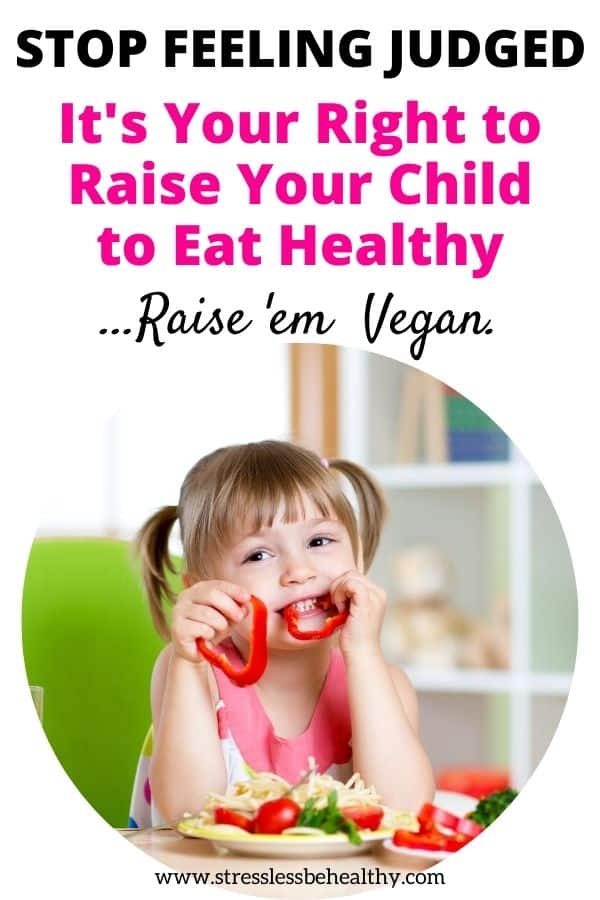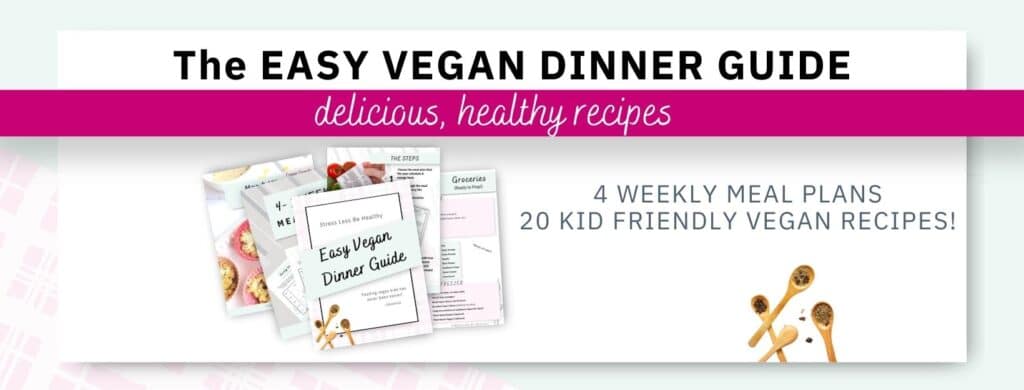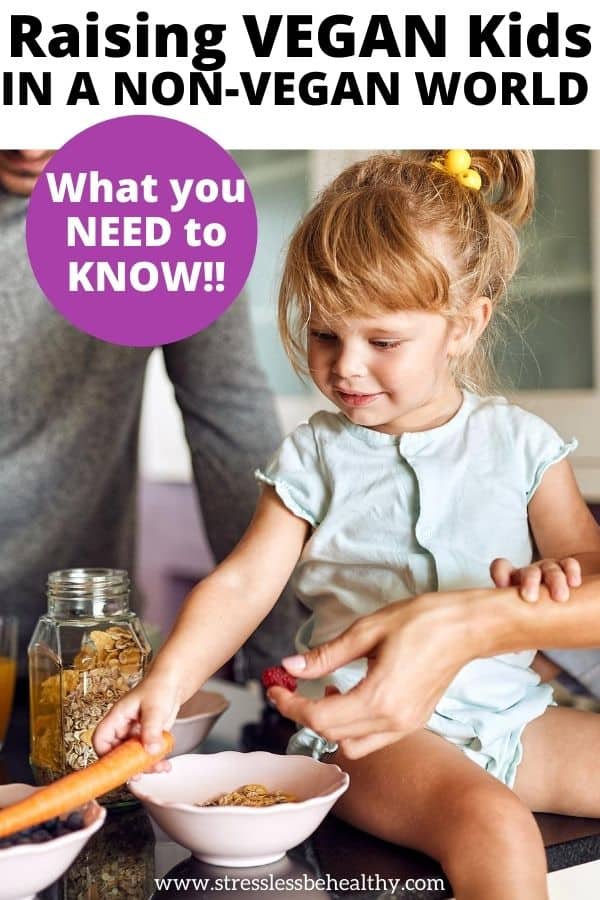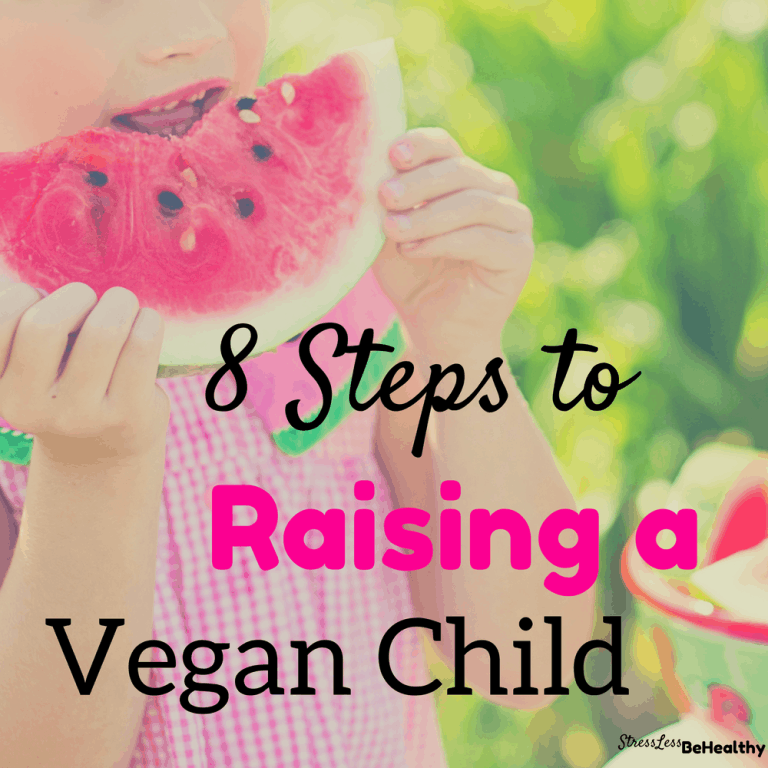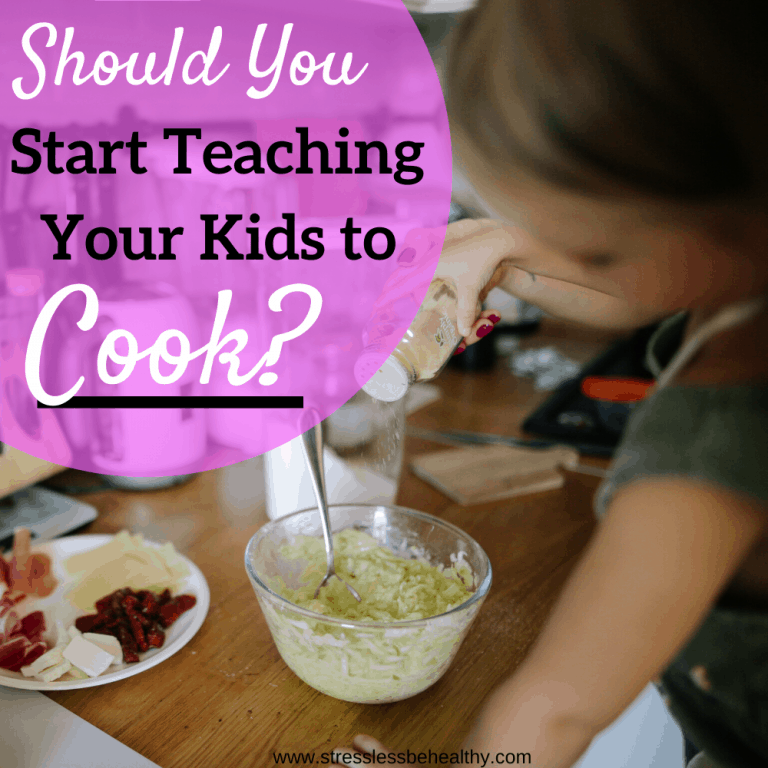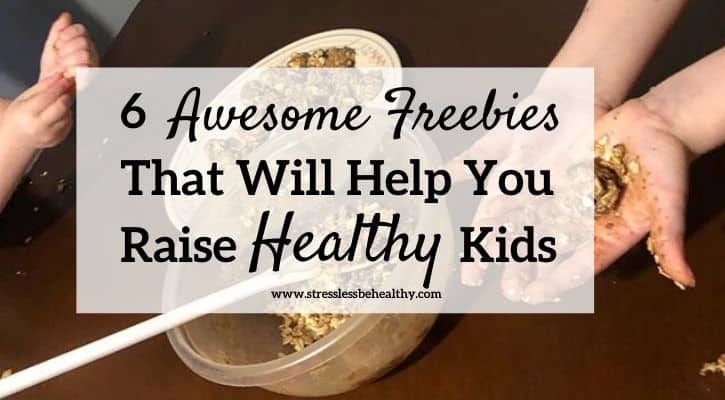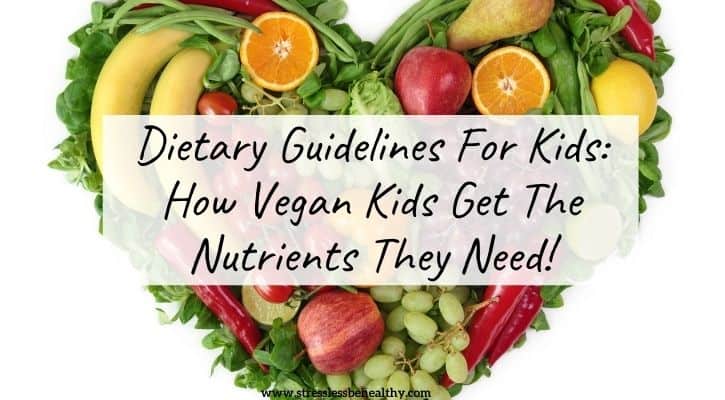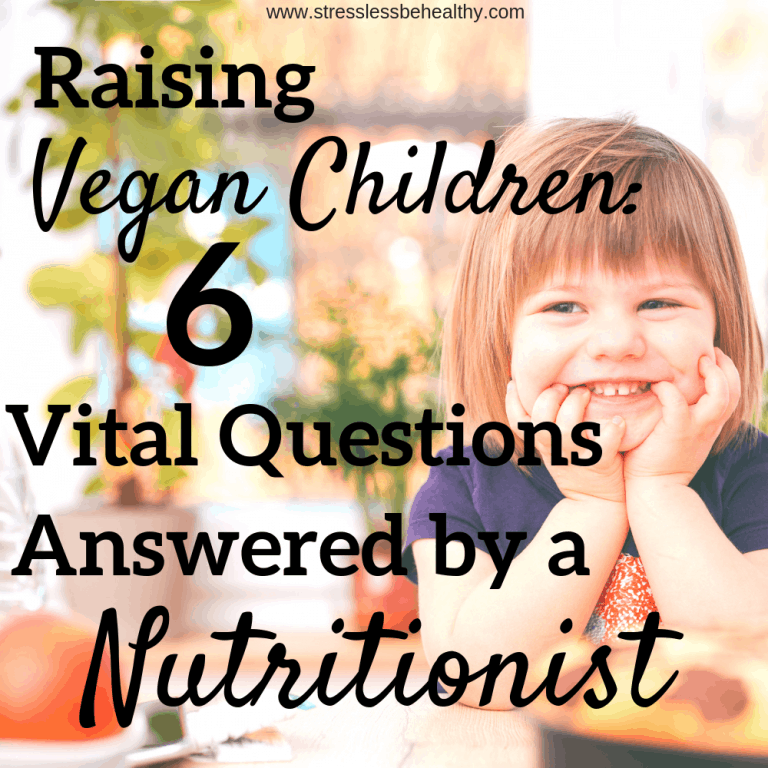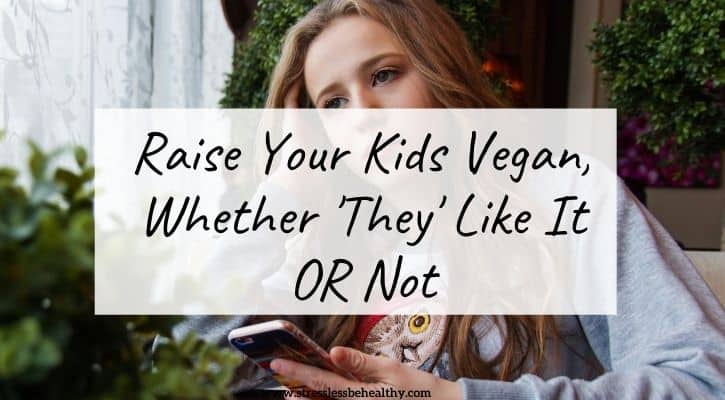How To Deal With Non-Vegans While Raising Vegan Kids
*Disclosure: some links may contain affiliate links. For more information on what this means, visit my disclosure page.
In this article you will find useful, practical ways on how to deal with non-vegans while raising vegan kids.
One of the hardest things you’ll have to deal with while raising vegan kids is other people, more specifically the non-vegans in your child’s life.
Vegans tend to get a bad rap sometimes, especially when it comes to trying to get others to eat vegan.
But honestly, I’ve never come across a vegan ‘forcing’ a non-vegan to eat ‘vegan’ food.
Never.
Not once.
I don’t even make my own husband eat vegan if he doesn’t want to (luckily, he now eats mostly plant based, but he certainly did not when we met, married, or for quite awhile after).
Non-vegans, however, oh boy.
Sometimes they’ll put meat or animal products into our food despite knowing that we’re vegan.
It’s happened to me before, and I’m sure I’m not alone.
And it’s one thing to have to deal with that as an adult. Yeah, they’re disrespecting you and it’s gross…
But when it comes to raising your kids vegan…
They’ve just crossed way over the line.
Unfortunately non-vegans currently out number vegans, by quite a bit.
So we’re bound to come across people who simply don’t get what being vegan is all about or why we choose to raise our kids vegan.
Some of these people, we or our kids may see on a regular basis, are:
- Grandparents
- Your siblings
- Your friends
- Other relatives
- Daycare providers
- Teachers
- Doctors
If everyone in your child’s life understands and is respectful of your family’s vegan diet, consider yourself blessed!
I’m not going to lie, since moving to the west coast, I’ve met far fewer people who think being vegan is unhealthy or won’t provide enough nutrients for kids to grow and thrive.
I feel so blessed to live in a community that accepts veganism and supports a healthy lifestyle.
But, I know you may not live in such a community, just as I hadn’t back on the east coast of the U.S..
So, how do you respectfully deal with those disrespecting your parenting decision?
*Please note that I am not a doctor or registered dietitian and am not liable for what you do with the information I provide. The following is for informational purposes only. If you or you child has a medical condition or you have concerns about raising vegan kids, please consult your pediatrician or a registered dietitian familiar with a vegan diet.
Inform Others of Your Child’s Vegan Diet
The first thing you need to do is inform the people in your child’s life who need to be informed.
The people who need to be informed are the people who, at some point, may feed your child or who needs to know for medical reasons, like the pediatrician.
What if my pediatrician doesn’t approve of me raising vegan kids?
If your pediatrician doesn’t approve, or doesn’t think your child can get all of their nutrients and thrive on a vegan diet; their wrong.
Now, you don’t need to switch pediatricians or tell them to their face that they’re wrong. That would just not be nice or respectful, and we need to be respectful if we want to be respected.
First, know that doctors are not required to have much training in nutrition; they have an MD not an RD after their names.
They went to school for medicine, not nutrition (though good nutrition is probably the best medicine there is, depending on what you need the medicine for)!
Instead, after you’ve informed them and they try to tell you that your child ‘needs’ meat for protein or ‘needs’ dairy for calcium; you could inform them how you plan on meeting your child’s nutrition needs and which supplements you’ll be providing them.
(Example: beans, lentils, legumes, nuts and seeds for protein & fortified non-dairy milk, green leafy veggies, and tofu for calcium.)
Sure, it may feel a bit silly that you have to defend the healthy food you’ll be feeding your child, while some parents feed their kids the Standard American Diet (and plenty of fast food and soda), and the doctor won’t even bat an eye!
But, they can only know what they are taught, just like us all.
If they don’t feel that the food you’ll be providing is sufficient, then ask if they can refer you to a registered dietician.
Preferably a dietician who is knowledgeable about plant based/vegan diets & preferably one that is covered by your insurance.
At that point, it’s up to you what you do.
But, if your insurance will cover your child going to a dietician so you can be sure that you’re providing them with the best nutrition possible; why not!!
You’ll be given more personalized nutrition advice and knowledge about a vegan diet for a growing child.
And knowledge is power! (And the knowledge will give you more confidence with how you’re feeding your child!)
Teach Don’t Preach!
Talking about knowledge…
People don’t like to be told they are wrong.
They don’t like to be told that they’ve been lied to all their life about what’s good to eat and what’s not.
They also don’t like to be told that they’ve been eating harmful ‘foods’ their whole lives.
It may be a trust thing.
We like to be able to trust those who are supposed to be teaching us or advising us about our health.
It’s not easy to find out the truth. Who knows if those who have taught or advised us knew the truth or not about animal products.
Therefore, when we are questioned about the way we decide to raise our kids, it’s best to be careful with the words we use.
For example;
Instead of explaining the environmental reasoning for raising vegan as,
“I’m raising my child vegan to save the world, consuming animal products is destroying our planet.”
Say it in a way that still gets the point across, but doesn’t make them seem like as much of a bad guy,
“I’m raising my child vegan to reduce our carbon footprint and help reduce greenhouse gases.”
Instead of explaining the cruelty-free reasoning for raising vegan as,
“My child is vegan because I want to raise a kind child who doesn’t force suffering upon other creatures and eat their rotting carcasses.”
It may be better to say it in a less graphic way that doesn’t demonize the non-vegan you’re speaking to, even if it makes you sound a little like a hippie.
“My child is vegan because we treat all animals the same, we love them, and wouldn’t ever dream of making our child eat them.”
Instead of explaining the health reasoning for raising vegan as,
“We’re raising vegan kids because it’s the healthiest diet there is and will help our kids live longer, healthier lives than non-vegan (non-plant based) kids.”
Try to say it in a way that doesn’t make other non-vegan parents feel like they’re bad parents.
“We’re raising vegan kids because it’s the healthiest diet for our kids, and feeding our kids healthy food is important to us.”
You don’t have to use those examples when actually talking to others.
I’m sure you can come up with some better way to say it and get your point across.
The point I’m trying to make is that you can’t be blunt to most people and think they’ll be alright with that and treat you and your pointing decisions with respect.
Unless that’s how you are with everything in life and others know that’s just who you are; then just be yourself!
However, some people may not ask why you’re raising your kids vegan, and simply ignore your parenting decisions…so what are you to do?
Ask for respect.
Maybe they didn’t hear you the first time.
Or, maybe they thought you were kidding or joking around.
Let’s just give the benefit of the doubt.
Just be sure you are being direct and letting them know your decision to raise your kids vegan has been made and it’s not temporary and not just for when your child is eating at home and you’re cooking.
Let them know that your child is not going to be consuming animal products, just as you would let them know your child has a food allergy.
People who aren’t vegan or worried about eating healthy may not understand the importance of what they feed your child.
Many parents raising vegan kids find it best to compare it to food allergies, as those are taken seriously.
If/When you send them to daycare, be sure to put it in the paperwork that your child is vegan and to treat animal products as an allergen. Who knows, your child may be allergic to eggs or milk; and you don’t want to find out from them trying it at daycare. No one wants to find out that way!
Do the same when/if you send them to preschool or elementary school. (Though, by elementary school, you should have had a chance to explain veganism to your child so that they understand what it means! Maybe even enough so that they teach others about it!)
If the teachers at the daycare, preschool, or elementary school don’t know what a vegan diet is or what is off limits, take the time to explain it to them.
Or take them an info sheet that shows what ingredients or food they should avoid giving to your child.
I know, in our world today it may seem shocking that some people don’t even know what vegan is.
But, some people don’t.
Some people think that being vegan is the same as being vegetarian, but it’s really not.
There are some big differences from vegetarian to vegan. But, to someone who has never had the urge to learn about it, they may not know.
Do you know everything you can and can’t eat on a keto diet, paleo diet, etc?
Probably not.
Those diets don’t pertain to you, so you don’t go searching for information on them.
Same goes for non-vegans learning about a vegan diet; unless it pertains to them, they won’t know.
Close Friends & Family
If you’ve been vegan for awhile, or have been raising your kids vegan for awhile, then I’m sure your close friends and family knows what it means to eat vegan; whether they wanted to know or not.
And, I don’t say that as assuming you’ve been stuffing vegan knowledge down their throat for years; I’m just sure at some point or another that it’s come up.
In many vegan parents’ experience, family can either be amazing and supportive of you raising vegan kids OR stubborn and disrespectful of your parenting desicion.
Sure, some friends and family may be somewhere in between the two.
But, this is food we’re talking about here!
There isn’t much else that hits as close to home as food.
Food can be such a touchy subject.
It’s part of how we grew up, it’s how we socialize.
Maybe that’s why our friends and family are either supportive, or just downright mean about how we choose to feed our kids.
My guess is that if your family isn’t that supportive of your parenting decision to raise your child vegan, they probably also feel offended in some way, like their food isn’t good enough for you and your kids or something.
Sometimes all they need, to start respecting your choice on how you raise your own child, is an explanation.
Explain to them why this is so important to you, why you feel it is the best way to feed your child. Take some of the tips from the article How to Convince Your Spouse To Raise Vegan Kids Together! if need be.
And then ask them to respect your decision.
Explaining how you feel about raising your kids vegan, explaining what is and what isn’t vegan, setting clear boundaries around it, and then asking for respect is just about as much as you can do for getting others to respect your decision.
The older your child gets, the easier it will be as well.
Once you can start teaching your child about veganism and how people get ‘food’ that isn’t vegan, there’s a good chance they’ll start advocating for themselves and what they do or do not want to eat.
I know my oldest daughter did when she went to kindergarten! Thank goodness her teacher was also vegan!
If you have any tried and true ways of respectfully or gracefully dealing with non-vegans, feel free to leave a comment under this article.
*If you’re following the Ultimate Guide to Raising Vegan Kids, know that this is not the last time we will touch on how to deal with non-vegans while raising vegan kids. This issue will pop up again in this guide, like when we discuss where in the world your child will get their protein from!
Didn’t start from the beginning? Start Here!
Need some inspiration for being or raising vegan? Check out the vegan quotes in Vegan Quotes: For Health, the Planet, & the Animals!
